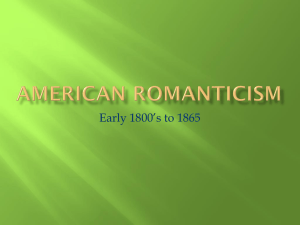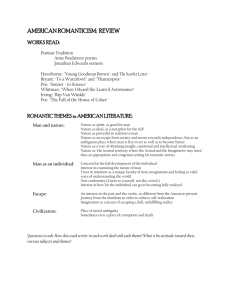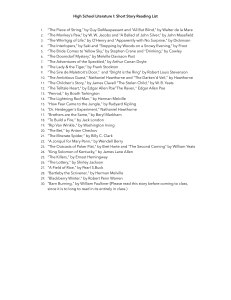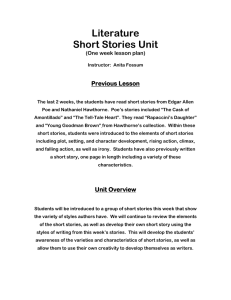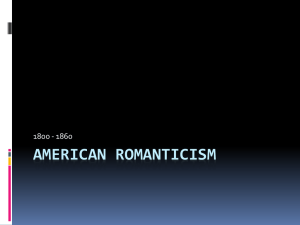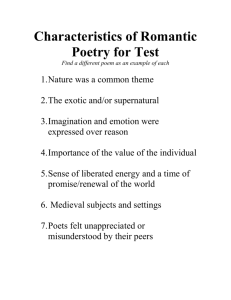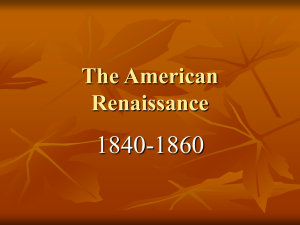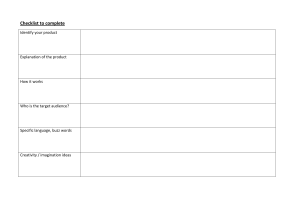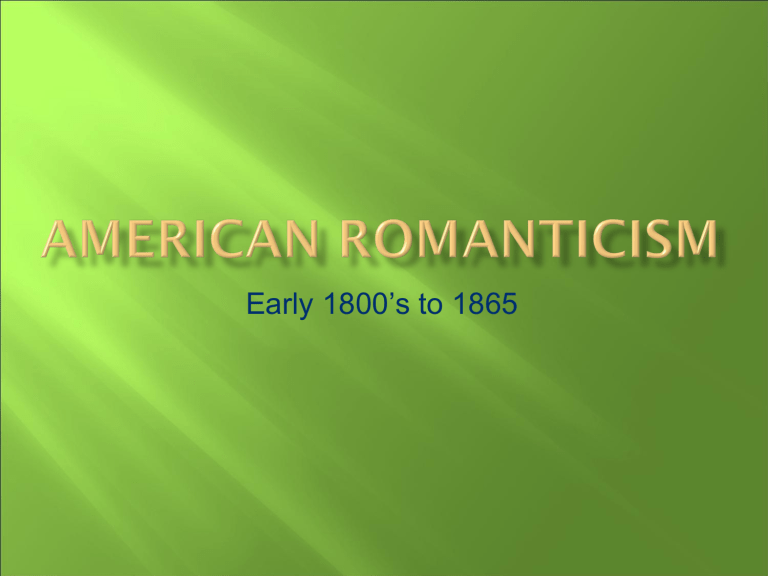
Early 1800’s to 1865 We will walk with our own feet. We will work with our own hands. We will speak our own minds -Ralph Waldo Emerson Despite the name of the literary period, Romanticism does not deal with sappy love stories. THIS IS NOT THE KIND OF LITERATURE THAT WE ARE GOING TO STUDY! Romanticism is the name for the literary period that followed the Age of Reason (The Revolutionary Period) in America. Due to the fact that the country was now established, writers moved their focus away from political matters and revolutionary governmental ideas, and began to focus on other aspects of life (emotions, possibilities, imagination etc…) Values feeling and intuition over reason Places faith in inner experience and the power of the imagination Shuns the artificiality of civilization and seeks unspoiled nature Prefers youthful innocence to educated sophistication Champions individual freedom and the worth of the individual Contemplates nature’s beauty as a path to spiritual and moral development Looks backward to the wisdom of the past and distrusts progress Finds beauty and truth in exotic locals, the supernatural realm, and the inner world of the imagination A sample of American Romantic art- note the wild landscape, no hint of civilization and ominous clouds. Short stories Novels Poetry Essays Frontier: vast expanse, freedom, no geographic limitations. Optimism: greater than in Europe because of the presence of frontier. Experimentation: in science, in institutions. Mingling of races: immigrants in large numbers arrive to the US. Growth of industrialization: polarization of north and south; north becomes industrialized, south remains agricultural. The quest for beauty and does not tell people how to live their lives Escapism - from American problems. The use of the far-away and non-normal Interest in external nature - for itself, for beauty: Nature as source for the knowledge of the primitive. Nature as refuge. Nature as revelation of God to the individual. Remoteness of settings in time and space. Improbable plots. Inadequate or unlikely characterization. Socially "harmful morality;" a world of "lies." Organic principle in writing: form rises out of content, non-formal. William Cullen Bryant Henry Wadsworth Longfellow DARK ROMANTICS Nathaniel Hawthorne Herman Melville Edgar Allan Poe Romantic VIEW OF MAN: Focus on the individual and his inner world (imagination and emotions). Romantic VIEW OF NATURE: Nature is beautiful, mysterious, and symbolic. God can be seen in nature. Romantic GUIDE TO TRUTH: Intuition (inner voice or gut feeling) and imagination guides each individual to understanding. Edgar Allen Poe with Hawthorne and Melville known as anti-Transcendentalists or Dark Romantics Had much in common with Transcendentalists Explored conflicts between good and evil, psychological effects of guilt and sin, and madness Dark Romanticists Herman Melville Nathaniel Hawthorne Edgar Allan Poe
